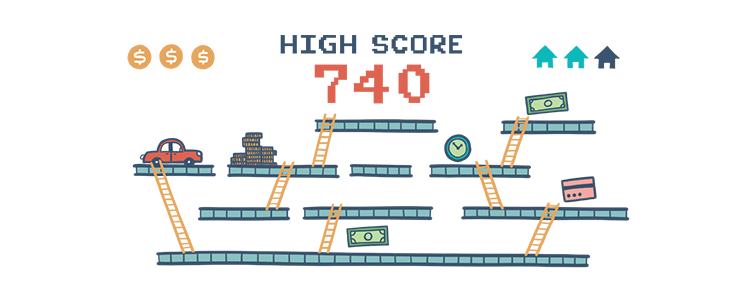Improve Your Credit History

First-time borrowers often have anxiety about low credit scores. They may not have a history of borrowing because they're young, they've never taken out a loan, or even had a credit card.
If you’re getting ready to shop for home mortgages, or any kind of large loan it’s a good idea to begin working on your credit history and getting that score up. To do that, it’s important to know the factors that affect your FICO score:
- Making payments on time: 35%
- Overall debt: 30%
- Length of credit: 15%
- New credit applications: 10%
- Types of credit: 10%
Know Your Score
You can only fix something when you know it’s broken, and knowing your credit score is the first step to helping it go up. Under the Fair Credit Reporting Act, you have a right to request your own credit report from a credit bureau to review it. This allows you to dispute any errors by writing to the relevant credit bureau, which must investigate the dispute within 30 days.
Start Building Credit
Starting a credit history is as simple as signing up for a credit card. Use a credit card to pay for everyday items and set up utility bill payments online through a credit card account in your name. Keep in mind to avoid accumulating debt by paying off the balance in a timely manner.
Don’t Let Your Balance Go Past-Due
Your payment history makes up 35% of your score, making it the most important factor of your credit. The more behind you are on your payments, the more it hurts your credit score. Try to pay off your outstanding balances in full rather than carrying it forward. In addition to avoiding interest payments, it will reflect favorably on your credit report when a lender updates your account status to "paid in full."
Don't Use ALL Your Credit
A key to scoring favorably on your credit is leaving most of it unused. Experts agree that if you use no more than 30% of your available credit, it affects your credit score positively. For example, if you have a 3 credit cards, two with a limit of $1,500 and one with a limit of $2,000, you have $5,000 total credit available. Keeping your combined balance under $1,500 (30% of $5,000) will help maintain a good credit score, because it shows lenders that you are able to use your given credit responsibly.
Avoid Applying for More Credit
When you apply for a new line of credit, lenders perform what is called a “hard inquiry” into your credit. This review of your credit itself affects your score. Applying for credit a number of times in a short timeframe sends a red flag to lenders who might assume that you’re in dire financial straits. So, if you are in the process of repairing a low credit score, avoid making any new applications for credit.

FHA Loan Articles
June 25, 2021Most first-time homebuyers decide on purchasing a home at least a year in advance, sometimes even a couple of years ahead of time. The earlier you make a decision to buy a home, the more time you have to save up for your down payment.
June 8, 2021While an FHA home loan is a good option for first-time homebuyers who don’t have enough money saved for a large down payment, it’s important to understand the ins and outs of the FHA guidelines, and what it takes to get approved as a borrower.
April 23, 2021No matter what kind of market you’re in, it is always best to get pre-approved before going to shop for houses. The last thing you want is to go look at homes, find the one you love, then have to wait on an approval and lose the dream home to another buyer.
March 29, 2021The FHA helps first-time and low-income homebuyers by having lower down payment requirements for its borrowers. Despite this lower credit eligibility criteria set by FHA, it is important to remember that FHA-approved lenders can set their own requirements
February 26, 2021Many Americans go with FHA loans because there are a number of mortgage programs that can fit different needs. These programs include FHA Fixed Rate Loans, FHA Adjustable Rate Mortgages, FHA One-Time Close Loans, FHA Condo Loans, and several others.
February 6, 2021As an existing homeowner, you may want to take advantage of falling interest rates by refinancing your current mortgage. For many homeowners, the thought of going through the refinancing process can be tiresome. But an FHA Streamline Refinance could help you avoid the extra work.








